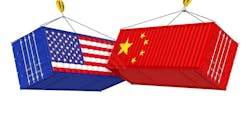When the World Steel Assn. issued its 2018 statistical summary recently there was a mild surprise: the Chinese industry — which by capacity is essentially equivalent to the rest of the world combined, and which is the object of constant manipulation by central planners trying to manage industrial development — increased its 2018 year-over-year output by 6.6% to 928.3 million metric tons. The numbers are extraordinary even if one knows nothing of the economics of primary steel, or the machinations of central planners in China, or the melodramatic posturing of steel executives everywhere about their precarious business.
Mainly, the numbers are remarkable because last year we were assured by the Trump Administration and its allies that tariffs on steel and aluminum would force Chinese producers and industrial policymakers into some sort of compliance with market reality (if not global trade regulations.) Well, the tariffs stuck and the Chinese steelmakers continue to melt and cast and roll.
China’s steel industry is too big to fail. Every other nation’s steel industry (as well as the technology and raw material suppliers, brokers and analysts) operates in reaction to it.
But the World Steel Assn. also revealed that U.S. steelmakers thrived under the cover of tariffs — increasing annual output by 6.2% to 86.7 million metric tons (95.6 million short tons.) These producers of course are thrilled by their profits, and the President understandably took credit for implementing the tariffs that “totally revived our Steel Industry.”
Steelmaking is not quite the avatar of economic well-being that it was half a century ago. Steelmakers’ profits don’t reward as many investors and workers as they did then, and mainly come at the expense of steel buyers, and the buyers’ employees and customers. It’s a much more complex world now, in which economic policies may shape results for a few quarters but do not make the world turn. Regardless of their recent profits, domestic steel stocks have not become noticeably more valuable as a result of the tariffs, regardless of their profits.
This is simply another frame through which to see that globalization is not a trend: it is the status quo. The financial imperative that began animating markets 20 years, propelling steady economic expansion and initiating a few panics, accomplished what it could do. Now, we are in the reactionary phase.
The reaction is evident in Chinese steelmakers’ 6.6% expansion under the “punishment” of U.S. tariffs, and even before that in resisting their own regulators’ efforts to pare back excess capacity. “Regulation” has them at the cusp of 1 billion mtpy.
Nearer to home the reaction to globalization is evident in the autonomy of private equity, indifferent to market regulations or enterprise sustainability; and in the relentless data-mining and consumer-tracking of tech giants, unyielding in their drive to map your behavior and model your inclinations. Economic growth is not happening globally, but granularly.
The populist movements underway in the U.S. and EU over the past three years are a reaction to globalism, too. But fighting government regulations and policies is a rear-guard action: the damage has been done. Countering globalist economics with market adjusting or limiting tactics will work for a bit, but it will not punish trade violators in any way that will cause them to reform. It will not reverse the damage of stolen intellectual property. It will not restore steel to an industry employing 1 million workers, nor any other industry downsized by economic change and technological adaptation.
More than that, tariffs will not prepare us to compete in the economic phase that’s already underway: a global fight over the profits of every consumer choice, every policy decision, every market swing. We may see that happening and we may recognize our opposition, but not our allies.
We are certainly headed for more profound economic conflict, and you and I will fare better if we know who’s fighting on our side. Profits are fine but we need principles first. Regulations and taxes defined the global economy with profit as the first principle. That’s what we are in reaction against now, and limiting markets (tariffs) simply defines the opposition. We need economic growth but first we must reaffirm individual autonomy, and foster behavior that is not reactionary or defensive, but generous and responsive.
About the Author
Robert Brooks
Content Director
Robert Brooks has been a business-to-business reporter, writer, editor, and columnist for more than 20 years, specializing in the primary metal and basic manufacturing industries. His work has covered a wide range of topics, including process technology, resource development, material selection, product design, workforce development, and industrial market strategies, among others.
